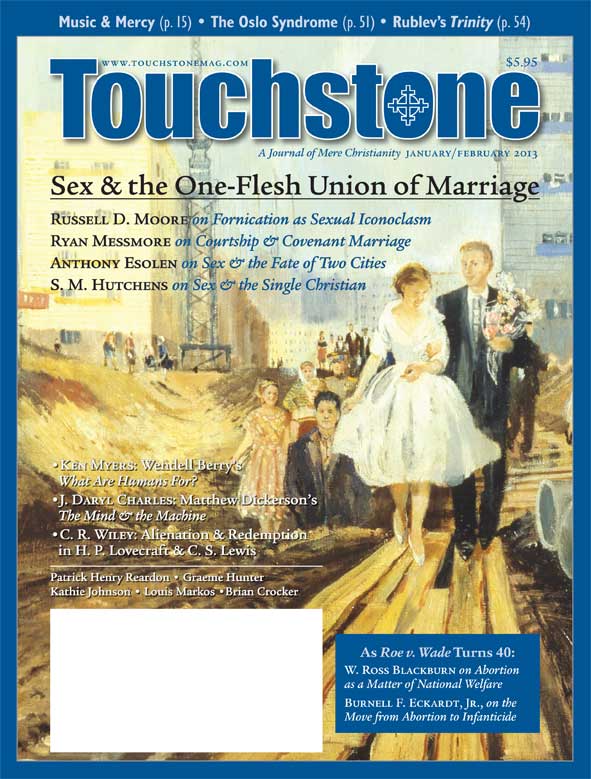View
Interlocking Hearts
S. M. Hutchens on the Consequential Metaphysics of Sexual Union
Friends in the Evangelical world who minister to young people of marriageable age tell me that one of the major difficulties their charges have is that they cannot find spouses. It is not as though potential husbands and wives are unavailable—perhaps they even abound—but in increasing numbers they don't seem able to engage in the kind of life and thought that leads to marriage, and are confused and diffident about their relations with the opposite sex.
While part of the problem must certainly involve their increasing adoption of a mindset unfriendly to the commitments of marriage and family-raising, and encouraged by their absorption in the secular world and its media, there seems to be an enlarging deficit of the moral resolve necessary for Christians to live in the world as Christians at all, stemming from a failure of the spiritual immune system. Where does this come from? Statisticians tell us that in the last several generations, young Evangelicals have become much more liberal (Evangelicals are certainly not alone in this) in their stated attitude toward most things sexual, and that now a majority of them are, to use the blunt biblical term, fornicating.
If there has been a sea change in their attitude toward marriage in roughly the same span as the change in their sexual mores, how could it not be related to the fact that most of the young adults whom my friends serve have become one flesh with the first person with whom they had sex, that they cannot or will not marry that person, and so they are in a state of permanent and irrecoverable alienation from themselves, resulting in spiritual, mental, and physical weakness in which they lack the resolve, that is, the strength—and considerable strength in many respects is needed—to pursue and form a strong, lifelong attachment to a husband or wife?
An Irrecoverable Loss
Most have been raised among Christians and know they have broken the law of God. In that breaking, they have broken something in themselves, but they aren't conscious of the extent of the damage, nor does their religion often speak of its character or magnitude. It tells them much about grace and forgiveness, but not what their sin is, nor what it does to them. It avoids the bad manners of speaking of sin at all, so most of its children are now badly mutilated by it, and although forgiven in this life to be made whole in the next, cannot recover what they have lost any more than the man with a severed spinal cord can regain the use of his limbs.
Did they really think they could do what they have done without real and disastrous consequences in their subsequent lives, consequences that include far more than a feeling of guilt that can be assuaged with the passing of time and a bit of Christian counseling? Did they think that "one flesh" business was just a sort of poetic expression, a patriarchal description of something that wasn't really real?
I speak now as a Protestant who was raised among them, but who has, much encouraged by C. S. Lewis and John Williamson Nevin, long departed that allegiance. I no longer believe, if I ever did, that an understanding shared by traditional Catholics, Orthodox, and the magisterial Reformers that is rejected by Protestant liberalism and a large number of conservative groups is mistaken—that acts to which older forms of Christianity attribute ontological and sacramental reality beyond the perception, control, or understanding of those who enact them are merely symbolical, their efficacy based not in an alteration of reality and the relations of the actors thereto, but limited to the mind's perception of its significance, and therefore to its testimonial quality. That these acts are symbols presented to the mind, and are testimonies, is certainly true, but as such, they are part of a very much larger truth. In severance from that truth, this narrower teaching about symbols becomes, like any heresy, false. Why should anyone faithfully trained by his sect in the "axiom that one thing is not another thing" (Screwtape) feel obliged to believe that in sexual congress there is the creation of "one flesh" from two that is soluble by nothing less than death?
And yet, I think, their bodies are wiser than their minds allow, and witness to the soul unbidden—we are speaking here of a believing soul—of a loss that has become irrecoverable in this life, and therefore of a pervading weakness and irresolution in regard to seeking another with whom to join.
Ministry in the House of Mourning
S. M. Hutchens is a senior editor and longtime writer for Touchstone.
subscription options
Order
Print/Online Subscription

Get six issues (one year) of Touchstone PLUS full online access including pdf downloads for only $39.95. That's only $3.34 per month!
Order
Online Only
Subscription

Get a one-year full-access subscription to the Touchstone online archives for only $19.95. That's only $1.66 per month!
bulk subscriptions
Order Touchstone subscriptions in bulk and save $10 per sub! Each subscription includes 6 issues of Touchstone plus full online access to touchstonemag.com—including archives, videos, and pdf downloads of recent issues for only $29.95 each! Great for churches or study groups.
Transactions will be processed on a secure server.
more on sex from the online archives
more from the online archives

33.1—January/February 2020
Do You Know Your Child’s Doctor?
The Politicization of Pediatrics in America by Alexander F. C. Webster
calling all readers
Please Donate
"There are magazines worth reading but few worth saving . . . Touchstone is just such a magazine."
—Alice von Hildebrand
"Here we do not concede one square millimeter of territory to falsehood, folly, contemporary sentimentality, or fashion. We speak the truth, and let God be our judge. . . . Touchstone is the one committedly Christian conservative journal."
—Anthony Esolen, Touchstone senior editor













